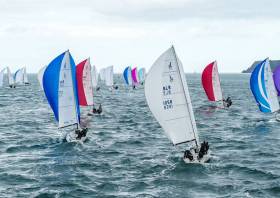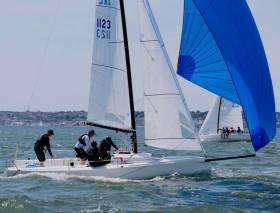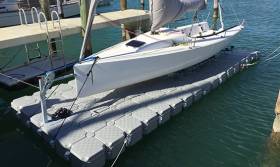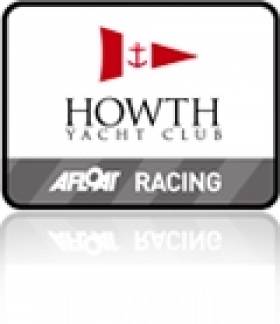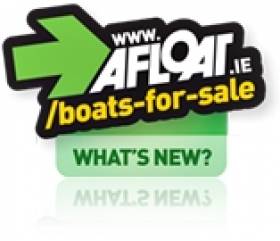Displaying items by tag: J70
Marshall King from Greystones and Ian Wilson’s Soak Racing followed up their Corinthian UK National title win at Royal Torbay last week with a strong start in the Darwin Escapes 2019 J/70 World Championship at the same venue, writes Louay Habib.
The event kicked off yesterday (Monday 2 September) with three races in Torbay, where big wind shifts and changes in wind speed tested the 78 teams competing as well as the race management team led by Stuart Childerley.
In the Corinthian class, Patrick Liardet (GBR) racing Cosmic ended the day leading by just one point from Doug Struth (GBR) racing DSP.
Wilson & King (IRL) completed a trio of British Isles boats leading the championship for the Corinthian title. There were also race wins for Pichu Torcida (ESP) racing Noticia, Reg Lord (AUS) racing Juno, and Nelson Mettraux (SUI) racing CER Aprotec–Ville de Genève.
In the Open class, Joel Ronning (USA) racing Catapult, led the championship after three races. Second was Claudia Rossi (ITA) racing Petite Terrible, which recovered from a 28th place in Race 1 to post two podium finishes. Andrey Malygin (RUS) racing Maria was third.
Greystones' Marhall King is the Corinthian UK J70 National Champion
Marhall King and Ian Wilson's Soak Racing is the Corinthian UK National Champion at Royal Torbay writes Louay Habib
Michael Goldfarb's Warcanoe from Seattle (USA) was the top team out of all the 35 international teams competing. Calascione & Ripard's Calypso (MLT) was third for the Open UK Championship, and second for the Corinthian entries. 2018 J/70 UK Champion, Doug Struth's DSP, was third this year.
For the final day light airs conditions continued, two races were completed won by the highly impressive Luis Albert's Patakin (ESP) and Peter Duncan's Relative Obscurity, which finally found a vein of form. Sergei Dobrovolskii's Amaiz Sailing Team (CYP) continued their sensational form to finish the regatta third overall. Marcos Soares' Highlanders and Renato Faria's To Nessa, both from Brazil, also impressed.
Paul Ward was awarded the J/70 UK National Championship Trophy by UK Class Captain, Hannah Le Prevost. “A big thank you to Bob Penfold and the Royal Torbay Yacht Club for all of their hard work in hosting this event. I would also like to thank all of our friends from the international fleet, which have helped us Brits to go faster! I am sure I speak on behalf of all the competitors to congratulate the race committee led by Stuart Childerley for giving us great racing in difficult conditions.” commented Paul Ward. “Looking at the trophy, it dates back to 2013, when I was thinking about buying my first J Boat. Since then I have been lucky enough to get involved with a very good team, which really enjoys being together. We have spent a lot of time sailing together and that is paying off.” continued Ward.
Ian Wilson and Marshall King won the championship in 2017, and third in 2018. “We are back with a bang this year, and this is a special one with so many great international teams competing. It was brutal out there; you made a mistake and you dropped 10-15 places, just by being slow out of a tack.” commented Ian Wilson, who is also President of the J/70 International Class. “I brought the nationals and the worlds here because it is one of the hardest places to sail in the UK if not the world – they don't play the US Open Golf at Augusta because it is a nice easy golf course, and so we have come to Torbay. This race area rewards those that keep their head out of the boat and it punishes those that don't.”
Greystones Olympian Marshall King in the Hunt for J70 Honours
The J/70 UK National Championship kicks off this UK Bank Holiday weekend hosted by the Royal Torbay Yacht Club where an Irish entry is a major contender writes Louay Habib.
The event precedes the Darwin Escapes 2019 World Championship (29 Aug – 06 Sept). However, this weekend's regatta is far more than a curtain-raiser for the big event. 35 teams will be racing at the open national championships with top British teams taking on a stellar international fleet from Australia, Brazil, Cyprus, Ireland, Italy, Malta, Norway, Russia, Spain, Sweden, and the USA.
2018 J/70 UK National Champion, Doug Struth's DSP, will be defending their title and will face stiff opposition from the best of British and Irish challenges to retain the trophy. Paul Ward's Eat, Sleep, J, Repeat and Soak Racing, sailed by Ian Wilson and Greystones Olympian Marshall King, have been the top two teams in this year's UK Grand Slam Series. Martin Dent's Jelvis, Jeremy Thorp's Phan, and Graham Clapp's Jeepster will all be in the running, as will Calascione and Ripard's Calypso, and Charles Thompson's Brutus. Fiona Hampshire's Royal Thames YC team will also be one to watch.
Entry List for 2019 J/70 UK National Championship here
Greystones Sailor Marshall King Wins UK J/70 Southern Area Championship at Royal Thames
Eight races were held in champagne conditions for 18 J/70 teams in The Solent. Bright sunshine and a huge range of wind conditions provided spectacular racing with fun-filled social events all organised by the Royal Thames Yacht Club. 2017 UK National Champions, Ian Wilson & County Wicklow's Marshall King in Soak Racing scored all podium finishes including five bullets to win the regatta and lift the Myosotis Cutter Cup.
“To be honest, the results flattered us,” commented Ian Wilson. “The J/70 UK fleet are getting faster and smarter, which is great to see. I think it is very important for the leading UK teams to race in the Solent because it does bring on the competition, and that pushes everybody on for a better performance. The Royal Thames event is a great won to win because it means you go to the their end of season prize giving, it took me two days to recover after the last one!”
In second place was John Greenland's Jdog, flying the colours of the Royal Thames, the team was racing one of the J/70s owned by the RTYC, four of which are available for charter. Despite not winning a race, Greenland's team was only out of the top five in one race during the eight race series.
Graham Clapp's Jeepster representing the Royal Southern YC started the regatta with a bullet and went on to score two more podium finishes, and no worse than eighth in the series resulted in third for the regatta.
In addition to the top three teams, six more teams made the race podium during the regatta: Niklas Zennstrom's Rán, Joshua Flack's Elizabeth, Patrick Liardet's Cosmic, Simon Cavey's Just4Play, Tara Gill-Taylor's RTYC Academy, and Phil Rys' Bryn.
The 2019 J/70 UK Grand Slam Series continues 18-20 July with Round 5,the J/70 UK Class Training Event, organised by the Royal Southern Yacht Club. Early entry fee applies until July 15, 2019. For more information: https://yachtscoring.com/emenu.cfm?eid=9454
Marshall King's J/70 Wins UK Grand Slam in Style at Warsash
Warsash Spring Championships on the Solent Ian Wilson & former Greystones-based sailor Marshall King's Soak Racing started the J/70 UK Grand Slam Series in style, winning the opening round of the nine-regatta Grand Slam Series.
The Irish Olympian (1996 Soling sailor) scored five bullets out of eight races over the two days, including a hat trick on the last day. Second was Doug Struth's DSP, who scored two races wins, as well as two-second places. Paul Ward's Eat, Sleep. J, Repeat was third, just one point ahead of Phil Rees racing Bryn. Ten teams made the top five over the course of the weekend.
Lift out on to hard standing is the ideal way to keep a sportsboat clean but has the added burden of lift in and out each time you want to sail. VersaDock, the modular floats provider for pontoons and dock solutions, has introduced its latest dry dock to give sportsboat and other small sailing boat owners the benefits of low maintenance and convenience of berthing their boats clear of the water.
The latest generation Version 2 of the VersaDock DrySail™ System (V2) has been designed and engineered specifically for modern lifting keel sports boats. New technology and design has enabled the DrySail™ V2 to be extremely light and very easy to assemble.
Drysail ™V2 is sold as an alternative to marina drysailing contracts, or being in the water for lond periods. It’s easy to winch your own boat in and out of the water in around a minute at any time. The stable platform gives handy all round access to the boat.
Drysail ™V2 is less than half the weight of previous generations of drysail docks, and its frames are smaller and easier to pack, which claims Versadock means there are huge savings to freight costs to any part of the world. Best of all, the new design is so simple to assemble that you can do it yourself, saving on installation charges.
The DrySail™ V2 system works in conjunction with all other VersaDock systems and can be integrated into their standard pontoons, platforms, drive on docks and walkways. The standard dock fits into a normal sized marina berth, turning it into a drysail platform, and it can be moored alongside other pontoons, or secured to river moorings. In fact its versatility means it can be put virtually anywhere where a boat can float onto it. It can even sit securely on the bottom if the tide dries out.
VersaDock has designed the new DrySail™ V2 dock for the J/70, Melges 24, SB20 and Longtze Premier, to name a few types of sportsboats, while the system can easily be optimised to fit individual requirements.
VersaDock are offering Drysail ™V2 at an introductory price of £6100 ex. tax and delivery for a typical J/70 dock until 1st July.
Howth Yacht Club Launches Sportsboat Cup for 1720s, SB20s, Quarter Tonners, RS Elites, Dragons & J Boat Classes
#hyc – A Sportsboat Cup for Irish keelboat classes to be held around Midsummers day and tailored especially for 1720s, SB20s, Quarter Tonners, J24s, RS Elites, Dragons, J80s and J70s, is to be staged for the first time at Howth Yacht Club in north Dublin from 20th - 22nd June 2014.
At this multiclass event each of the sportsboat classes will be given their own start, results and prizes.
The event will incorporate the 1720 European championships as part of the event and there is an expectation of visiting UK and continental crews too.
Racing will be one design with the exception of the quarter tonners and mixed class who will race under IRC. Class rules will apply where applicable.
HYC says any other sportsboat type that has an IRC cert will also be accommodated in a mixed sportsboat fleet.
Howth is using the event to champion its sailing facilities both on the water and ashore at the 'bustling fishing village' venue that is also close to Dublin airport.
The largest club in the country has two cranes, a 300–berth marina, sizeable hardstanding, a large club house with bar, terrace and dining facilities not to mention secure changing and showering facilities
HYC is ideally placed to host this Sportsboat Cup. Car parking, craning, berthing and trailer storage are all included in the entry fee and racing will be organised by top National and International Race Officers.
With no racing starting before 12 each day there will be ample time to freshen up in the morning after the great social that is planned for each evening.
Online Entry available by clicking the HYC advert at the top of the Afloat homepage.
J/70 Sportsboat Test Sails Dates Announced for Dun Laoghaire
#J/70 – It looks like a new 'pocket rocket' sportsboat is set to enter the Irish sailing scene with news that Key Yachting Ltd (the dealer for J Boats in the UK and Ireland) is planning a J/70 Trial Sail Weekend in Dublin Bay from Friday 6th of September to Sunday 8th of September. The event will be hosted by the Royal Irish Yacht Club in Dun Laoghaire and representatives from North Sails Ireland will also be on hand throughout the weekend.
Well know sportsboat sailor Roger Bannon has already taken one for a spin and his J70 Boat Report is here.
The plan is to offer those who are interested in the J/70 the chance to sail the boat either Friday afternoon, Saturday morning, Saturday afternoon or Sunday morning
Key Yachting say they will try to ensure that we are able to accommodate as many trial sails as possible during the weekend, but promoters say it would help enormously with the planning if you could let them know when you would like to come.
If you are keen to take this super-fast sportsboat for a spin around the bay, email [email protected]
J70 Sportsboat Design Debuts on Dublin Bay Race Track
#J70 – The recent arrival of the 22.75 foot 'pocket rocket' J70 design into the Royal Irish Yacht Club has been creating quite a stir.
The J70 represents the culmination of several years design effort by the highly regarded J boats firm.
Having recently sold his SB20 sportsboat in which Dublin Bay sailor Roger Bannon had enormous fun over the last five years, the new challenge he says is to find an alternative boat which provides a similarly lively and rewarding performance with perhaps a bit more comfort and security.
Is it the J70? He took a spin in one and his conclusions are here on Afloat Boats for Sale site.


























